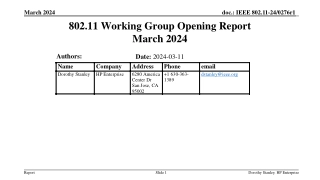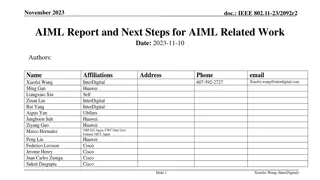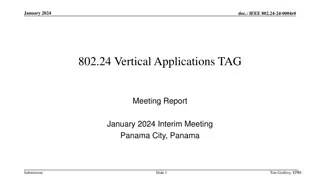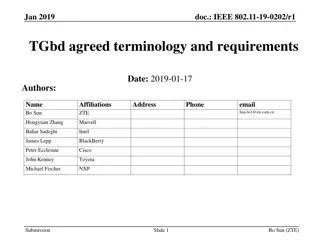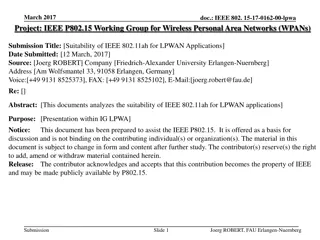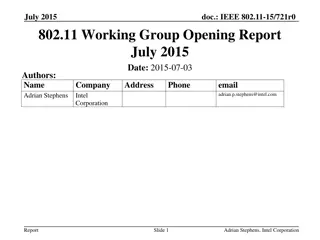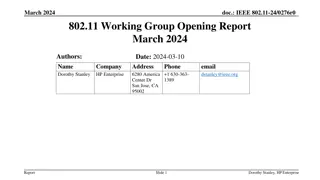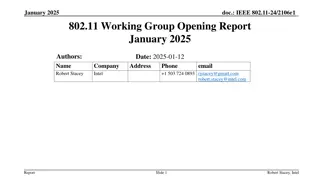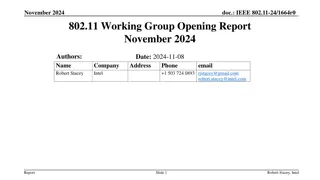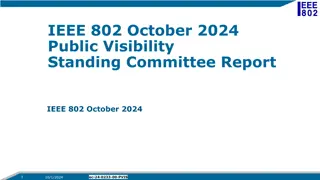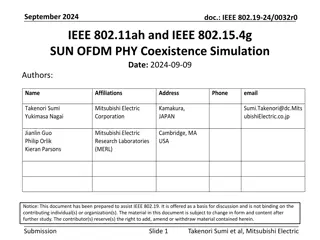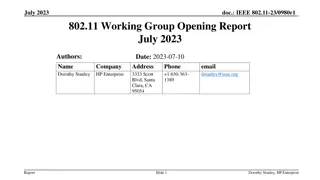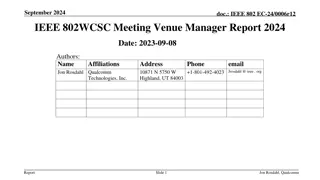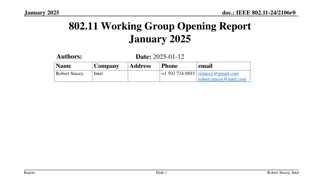IEEE 802.11-24/0709r2 Opening Report Snapshot Slides
This document contains snapshot slides from the IEEE 802.11 Working Group's May 2024 session, including reports, meeting details, status updates, and agenda items. Authors from Huawei, Intel, and other affiliations provide insights into ARC, ANA, TGbe, and more.
Download Presentation

Please find below an Image/Link to download the presentation.
The content on the website is provided AS IS for your information and personal use only. It may not be sold, licensed, or shared on other websites without obtaining consent from the author.If you encounter any issues during the download, it is possible that the publisher has removed the file from their server.
You are allowed to download the files provided on this website for personal or commercial use, subject to the condition that they are used lawfully. All files are the property of their respective owners.
The content on the website is provided AS IS for your information and personal use only. It may not be sold, licensed, or shared on other websites without obtaining consent from the author.
E N D
Presentation Transcript
Forms of Drama: Tragedy
Definitions & Features The term is broadly applied to dramatic representations of serious and important actions which result in disastrous conclusion for the protagonist Originated in ancient Greece in the sixth century Thereafter, the form travelled to Rome in the second century B.C. English drama begins during the Elizabethan age B.C.
Aristotles Poetics Discussions of the tragic form begin with Aristotle s Poetics (fourth century B.C.) His theory based on the examples of early Greek tragedies He defined tragedy as an imitation [mim sis] of an action that is serious, complete, and of a certain magnitude through pity and fear effecting the proper purgation [catharsis] of these emotions. Tragic hero, according to Aristotle, should not be thoroughly good or thoroughly evil He should be better than we are , and suffers a change of fortune from happiness to misery due to his hamartia, his tragic flaw or error of judgement
Elizabethan tragedy With the Elizabethan era, drama begins in England Tragedies of this period owes much to the native religious drama, the miracle and morality plays Roman writer Seneca was a major influence His plays provided the model for an organized five-act play with complex plot and a formal style of dialogue Drama developed in two ways: academic tragedies written in imitation of Senecan model, example Thomas Sackville and Thomas Norton s Gorbuduc
contd Second, the revenge tragedy, or the tragedy of blood Usual elements included murder, revenge, ghosts, mutilation and bloodshed Thomas Kyd s The Spanish Tragedy established this popular form Other important revenge tragedies include Marlowe s The Jew of Malta and Shakespeare s Hamlet These plays also depart from Aristotelian norms A mixed mode called tragicomedy also developed during this period The famous Gravedigger scene in Hamlet
Drama after Shakespeare In the seventeenth century (Restoration Period) produced a form of tragedy which crossed epic and tragedy called heroic tragedy like Dryden s The Conquest of Granada In the eighteenth century, the bourgeois or domestic tragedy became popular with a middle- or lower-class protagonist. Example, George Lillo s The London Merchant One of the most notable modern tragedies is Arthur Miller s The Death of a Salesman, a play in which the chief character is an ordinary shoe salesman defeated by the false values of a commercial society


